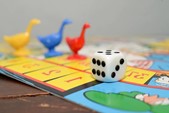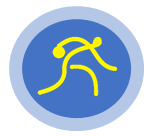Connections to the BC Curriculum – Core Competencies
 The BC Curriculum emphasizes Personal and Social as a core competency with the goal that all students understand themselves, develop a positive self-identity and self-worth, and understand their roles and responsibilities within society.
The BC Curriculum emphasizes Personal and Social as a core competency with the goal that all students understand themselves, develop a positive self-identity and self-worth, and understand their roles and responsibilities within society.
The Positive Personal & Cultural Identity Competency Profile identifies three facets related to self-awareness:
- Relationships and cultural contexts
- Personal values and choices
- Personal strengths and abilities
The Positive Awareness & Responsibility Competency Profile identifies three facets related to self-awareness:
- Self-determination
- Self-regulation
- Well-being
Recreation and Leisure Skills - Students with Visual Impairments
For students with visual impairments, learning about opportunities for recreation and leisure is important. While sighted students observe people in their communities at work and play, students with visual impairments might miss this information if their attention is not drawn to it. Providing students with visual impairments several opportunities to try a variety of different leisure activities in a safe environment will help them get a sense of what they enjoy and encourage them to become proficient allowing them to dive deeper into the experience. Also, connecting students with community and non-profit organizations that focus on adapted sports like hockey and goalball can further social skills such as collaboration, self-regulation and problem solving.
Areas of recreation and leisure include (McGregor and Farrenkopf, 2017):
- Individual sports
- Team sports
- Games – e.g. board games, card games, video games
- Media: videos, music, reading and writing
- Arts and crafts and fine arts
Examples of Recreation and Leisure Skills
- Demonstrate independent play
- Working with a partner or group
- Following rules or turn-taking
- Aware of personal safety
- Interacting and communicating effectively with others
Resources to Support Instruction
PRCVI Library Catalogue
- Blaine, J. N., & Lonergan, M. J. (2009). Encouraging physical activity for preschoolers with visual impairment: A resource for parents. Vancouver: BC Blind Sports and Recreation.
- This resource (which includes a written guide and DVD) offers ways to help children be physically active and to lay the foundation for a lifetime of physical activity.
- Aillaud, C. L., & Lieberman, L. (2013). Everybody plays!: How kids with visual impairments play sports. American Printing House for the Blind. [Student Material]
- Follows an elementary school-age child to a sports camp for children who have visual impairment, blindness, or deafblindness. Written at a 4th grade reading level, readers learn about sports and recreational physical activities that are enjoyed universally and about specific sports designed for persons with visual impairment and blindness.
- Angelidis, J., & Marraffa, S. (n.d.). Adapted PE kit resources for students who are blind or visually impaired. PRCVI [Resource Kit]
- Helpful adaptations of popular sports such as archery, badminton, basketball, bowling, curling, hockey, golf, skiing, soccer, tennis, and volleyball as well as non-competitive and outdoor activities.
- Lieberman, L. J., Ponchillia, P. E., & Ponchillia, S. V. (2013). Physical education and sports for people with visual impairments and deafblindness: Foundations of instruction. New York: AFB Press. [Professional Text]
- Text provides practical and essential information on topics including: Methods of modifying physical skills instruction; techniques for adapting sports and other physical activities; & teaching methods and curriculum points for physical skills instruction throughout the lifespan.
- PRCVI. Adapted sports equipment and leisure materials.
- The PRCVI online catalogue has many piece of adapted sports equipment (e.g., sounds balls, adapted tennis kits) and co-operative and board games (e.g., Connect Four, Uno!, and Scrabble). Use the descriptors below to search our collection.
Web-Based Resources
- BC Blind Sports and Recreation Association (2020). An opportunity for all: Staying active while we are #TogetherApart. Retrieved from https://prcvi.org/resources/the-expanded-core-curriculum/recreation-and-leisure-skills/staying-active-while-we-are-togetherapart/
- Weekly recommendations for staying active while learning and connecting from home from the BC Blind Sports and Recreation Association
- BC Blind Sports and Recreation Association (2019). Boccia for students with CVI Retrieved from https://prcvi.org/resources/the-expanded-core-curriculum/recreation-and-leisure-skills/recreation-leisure-skills/boccia-for-students-with-cvi/
- Activity day offered in partnership with PRCVI for students with CVI. Web page features photos from the day as well as some of the adaptations that were made to the Boccia equipment and rules.
- Canadian Paralympic Committee (n.d.). Overview of Paralympic sports. Retrieved from https://paralympic.ca/paralympic-sports
- Learn about the possibilities for meaningful participation in sports for students with visual impairments. For example, para-swimming, para-cycling, boccia, para-rowing, and goalball.
- CNIB. Music for Kids with CNIB Foundation BC/Yukon. Retrieved from: https://cnib.ca/en/event/music-kids-tuesday-session?region=mb
- Music Therapist Erin Koop leads virtual music therapy sessions for children and youth with visual impairments across the country.
- Lieberman, L. (2008). Recreation and leisure factsheet. The National Consortium on Deaf-Blindness. Retrieved from https://www.nationaldb.org/info-center/recreation-leisure-factsheet/
- Fact sheet from renowned expert Dr. Lauren Lieberman. Topics include safety, age-appropriateness, and teaching strategies for engaging deafblind learners in recreation and leisure opportunities.
- PRCVI (2018). Move to include all children. Retrieved from https://www.prcvi.org/resources/the-expanded-core-curriculum/recreation-and-leisure-skills/recreation-leisure-skills/move-to-include-all-children/
- A two-day workshop hosted by PRCVI and the Surrey School District with Dr. Lauren Lieberman. Web page lists the resources and materials that were mentioned and demonstrated by Dr. Lieberman.
 LEGO® Audio & Braille Building Instructions
LEGO® Audio & Braille Building Instructions- Check out this set of audio and refreshable braille display-friendly instructions for building with LEGO! Kits from the PRCVI Library.
References
McGregor, D., & Farrenkopf, C. (2017). Recreation and Leisure. In Foundations of education (3rd ed., Vol. 2, pp. 804–830). New York, NY: AFB Press, American Foundation for the Blind.
 Board Game Adaptations at Your Fingertips!
Board Game Adaptations at Your Fingertips!
 With the pressures and expectations of our daily ‘on the go’ schedules, learning how to relax and release stress is important. Participating in recreation and leisure activities that are physical activities can promote fitness and a healthier lifestyle. Leisure activities such as hobbies can be a creative outlet. Becoming aware of and developing recreation and leisure skills can lead to a sense of wellbeing in the pursuit of fun.
With the pressures and expectations of our daily ‘on the go’ schedules, learning how to relax and release stress is important. Participating in recreation and leisure activities that are physical activities can promote fitness and a healthier lifestyle. Leisure activities such as hobbies can be a creative outlet. Becoming aware of and developing recreation and leisure skills can lead to a sense of wellbeing in the pursuit of fun. The BC Curriculum emphasizes Personal and Social as a core competency with the goal that all students understand themselves, develop a positive self-identity and self-worth, and understand their roles and responsibilities within society.
The BC Curriculum emphasizes Personal and Social as a core competency with the goal that all students understand themselves, develop a positive self-identity and self-worth, and understand their roles and responsibilities within society. LEGO® Audio & Braille Building Instructions
LEGO® Audio & Braille Building Instructions